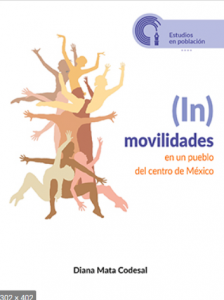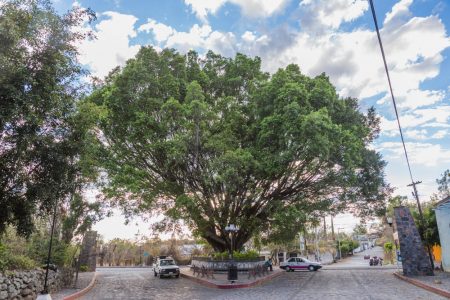There is not enough research on immobility. Some of that research still approaches immobility as a default, homogeneous and unproblematic state. However, the few studies specifically addressing immobility (including my own ethnographic research in rural Ecuador and Mexico) prove how immobility, similar to migration, is an embodied experience, culturally constructed and socially enacted. There is not a unique sociocultural construction of what staying put means, as different variables are associated with different meanings. In my work on immobility I explore how immobility is socially constructed and imbued with meanings, how different groups of people in different locations experience immobility, as well as how mobility and immobility are mutually defined and articulated. I am particularly interested in the gendered dimension of (im)mobility.
This is the Arbolito (little tree) welcoming you to the lovely Mexican village of Zacualpan. I use a tree metaphor, to convey the idea of im/mobility, with its branches-roots.
More recently, I have expanded the idea of immobility to work on the subject of autochthony and the creation of the ‘we’ in a peripheral neighbourhood of the Spanish city of Barcelona. In this project I have explored the processes of othering and we-nessing taking place between a group of older internal migrants and younger international ones.
Below it is the list of works I have published on the topic so far. They are in English and in Spanish. You can access them through academia.edu or email me.
In English:
Mata Codesal, D. (2018). Is it Simpler to Leave than to Stay Put? Desired Immobility in a Mexican Village. Population Space and Place Early View.
Mata Codesal, D. (2017). Gendered (Im)mobility: Rooted Women and Waiting Penelopes. Crossings: Journal of Migration and Culture 8(2): 151-162.
Mata Codesal, D. (2015). Ways of Staying Put in Ecuador: Spatial and Temporal Analysis of Mobility-Immobility Interactions. Journal of Ethnic and Migration Studies 41(14): 2274-2290.
In Spanish:
 Mata Codesal, Diana (2016) (In) movilidades en un pueblo del centro de México. Cuernavaca, Morelos : Universidad Nacional Autónoma de México, Centro Regional de Investigaciones Multidisciplinarias .
Mata Codesal, Diana (2016) (In) movilidades en un pueblo del centro de México. Cuernavaca, Morelos : Universidad Nacional Autónoma de México, Centro Regional de Investigaciones Multidisciplinarias .
219 páginas. ISBN: 978-607-02-8328-4
Pincha aquí para descargar el libro completo.
También disponible en formato .epub y .mobi (Kindle) desde http://www.crim.unam.mx/web/node/1833.
Mata Codesal, D. (2016). ¿Es Necesario Desmigrantizar Nuestras Investigaciones? Ankulegi-Revista de Antropología Social 20: 47-60.
Mata Codesal, D. (2015). Mujeres Enraizadas y Penélopes que Esperan. Apuntes Exploratorios en Relación al Género y la Inmovilidad. Actas del VIII Congreso sobre Migraciones Internacionales en España. F. J. García Castaño, A. Megías Megías and J. Ortega Torres (cords). Granada: Instituto de Migraciones.
Mata Codesal, D. (2014). Inmovilidad Transnacional. Periferias, fronteras y diálogos. Actas del XIII Congreso de Antropología de la FAAEE. URV (ed.). Tarragona: Servei de publicacions de la URV.
